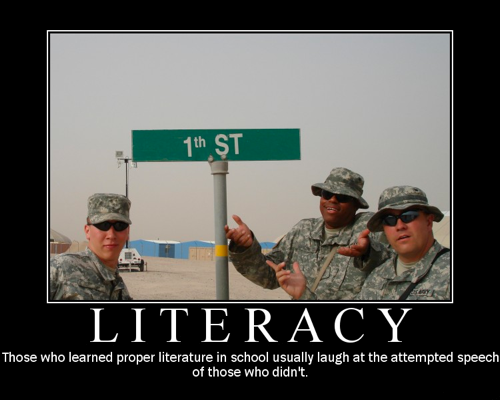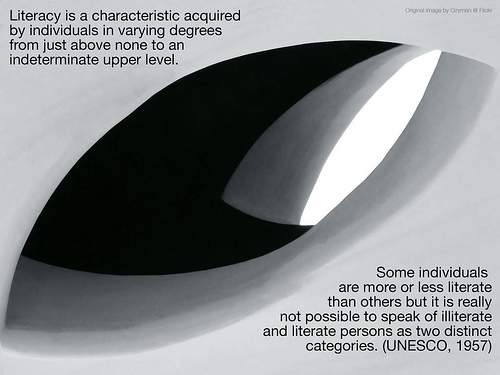Meeting with Ed.D. thesis supervisor: ‘aspirational naming,’ hegemonic power and finishing early?
Image by gagilas @ Flickr
Last Wednesday I met with Steve Higgins, my Ed.D. supervisor at the University of Durham. I enjoy the level of intellectual conversation I have with him and this meeting was no exception. Our discussion ranged from everything from Foucault to doing online shopping for your grandmother(!) and seemed to fly by. This post serves as a reminder for me and an insight for those interested in my chosen topic of ‘digital literacy.’
Concept maps and ‘umbrella terms’
Those familiar with the enormous Ed.D. concept map I produced will be familiar with the fair amount of complexity it contains. Steve suggested that I go back to it and attempt to synthesize some of the elements, perhaps by reworking it into a kind of Venn diagram. I replied that at the moment it’s something I don’t want to spend too much time looking at (because it took so long to produce), but will go back to it eventually!
I expressed my (somewhat tongue-in-cheek) annoyance that Lankshear and Knobel in the introduction to their 2008 Digital Literacies had pointed out and drawn attention to something I was going to present as a new analysis in my thesis: the ‘umbrella term.’ Many theorists take their conception of literacy and consider all others in the light of it, usually relegating them to some type of ‘sub-literacies.’ Steve suggested I try a different metaphor than umbrellas… 😉
Intentionality and trajectories
Steve reminded me that there is a ‘rhetoric’ to everything produced by theorists, even those who are leaders in the field (e.g. Lankshear and Knobel). There is an intention behind what they are doing; they are, to some extent, ‘tussling for position’ and attempting to prove a point.
All theorists in the realm of ‘new literacies’ deal in neologisms. That is to say they coin terms that they hope will enter common usage. Steve posited the idea of a ‘trajectory’ – that I need to show in my thesis where theorists are ‘coming from,’ what their definition is, what they’re trying to achieve through that definition, and then the logical implications and practicalities of this.
Language issues
At some point during the discussion I mentioned that I’d read that Norwegian has no word for ‘literacy’ as they use a different, but related term. I suggested that this might allow Norwegians to bypass some of the historical baggage bound up with the term ‘literacy.’ Steve pointed out that Norwegian also makes no distinction between ‘efficient’ and ‘effective’ which, if you think about it, is rather problematic. I can think of lots of efficient yet ineffective people vice-versa! :-p
I moved on to Gunther Kress‘ argument that because many languages don’t have the term ‘literacy’ then sub-dividing it into ‘visual literacy,’ ‘digital literacy’ and the like was problematic. I mentioned that I wasn’t convinced by his argument. Steve pointed out that English is a richer language (in terms of number of words) than other languages. This means that there may be actually an advantage in breaking down terms in English into sub-areas as it may be difficult to work out of a genuinely complex ‘super-concept.’
Thesis structure
The structure of all theses tend to be in a state of flux until towards the end, and mine is no different. Given that I’m doing a rather bizarre thing – a conceptual, vocational doctorate(!) – the structure is not prescribed nor, indeed, self-evident. I pointed out to Steve that although it is usual to write the ‘methodology’ chapter after the ‘literature review,’ it might actually be a better idea and more coherent to the reader if the methodology comes before the literature review.
I’m planning to write a chapter on ‘digital flow,’ after being inspired by Csikszentmihalyi’s seminal work Flow: the psychology of optimal experience. One of the issues with ‘digital literacy’ is, as Steve put it, ‘aspirational naming’: we come up with terms describing states to which we aspire. ‘Digital flow’ (as I shall define it) would be on the same spectrum and would, inevitably, include value judgements and aspirational statements about how I want the world to be. We’re came back our earlier mention of intentionality.
After coming up with a (tentative) definition of ‘digital flow’ I shall be doing some policy analysis looking at whether conceptions of digital literacy and/or flow are embedded in pronouncements and practice in countries ranging from the UK to Singapore. Steve suggested that I look at the relation between literacy and hegemonic power; ‘the position of the individual relative to the discourse.’ Steve’s of the opinion that power comes as a ‘valuable incidental’ to those in power and control and that they don’t necessarily reinforce this on purpose through such things as literacy practices. It’s a question of ‘coherence and complexity’ despite Marxist rants to the contrary. He suggested I look at the difference between devolved and ‘real’ power (c.f. Foucault).
The nature of literacy
I’ve avoided in my thesis up to now discussion of ‘media literacy’ as I thought it would take me down a rather tangential rabbit-hole. However, as Steve pointed out, at the end of the day it’s all about semiotics and the encoding of meaning. It’s about production and reproduction, said Steve, as letter-based literacy is a ‘dense’ and precise method of exchange. Visual literacy, media literacy and the like points towards more metaphorical use of language. Poetry, for example, would be somewhat of a ‘halfway house.’
It was at this point that I re-conceptualized what Steve said as being almost a continuum ranging from the ‘literal’ use of language in literacy left to ‘metaphorical’ use of language on the right. Text-based literacy would be on the left whilst umbrella terms – metaphors of metaphors (or ‘second order metaphors’) would be on the right. It may be interesting to plot conceptions of literacy on such a continuum in my actual thesis.
This reminded Steve of C.S. Peirce‘s idea of ‘firstness,’ ‘secondness’ and ‘thirdness.’ This relates to something which equates to ‘raw perception’ (‘firstness’), the ‘idea’ of it (‘thirdness’) and the way of trying to express this (‘secondness’). I think this could be a really effective addition to my discussion of the ‘red pillar box’ in my phenomological introduction (sample below):
Human beings are tasked with making sense of the external world. We feel the need to decipher and communicate oft-repeated experiences and sensations, allowing other minds to share the same (or similar) conceptual space to our own. For example, research in Phenomenology tells us that two individuals may have two markedly different sensations when viewing a red pillar box. If, however, they agree on the category ‘pillar box’ to refer to approximately the shape they see before them, and that the colour sensation they are experiencing shall be called ‘red’, then meaningful discourse can ensue.
Returning to the policy document analysis, Steve re-iterated that I need to concentrate on producing an ‘interesting synthesis’ rather than getting bogged down in detail. I also need to separate out in my thesis the difference between ‘digital literacy’ and ‘being digitally literate.’
Finishing early
I mentioned to Steve – as I have done at previous meetings – that I’d like to have my thesis finished by next summer. That’s a year before my official end date, after which people are still allowed a year of ‘writing up.’ There’s three reasons why I want to finish early:
- I want to finish before I’m 30 (December 2010)
- It’s costing £thousands every year.
- Every additional year I take is another year in which I have to consider and attempt to synthesize other people’s work into my thesis.
The official line for the Ed.D. is that the taught elements give the skills to undertake something at equivalent level to Ph.D. This is usually done where there’s a professional dimension to this ‘something.’ However, overlaps with other areas (in my case, for example, politics and philosophy as well as education) is inevitable. The examiner will ultimately be looking for ‘doctorateness’ and whether the thesis is sufficiently conceptually rich. 🙂
Steve said he’d get back to me with whether I’d be able to finish early, which he did the next day. It turns out that, officially, the earliest I’m allowed to submit is January 2011. I could apply for a concession to submit early, but given Durham’s ‘glacial bureaucracy’ and the second point in the list above, it’s unlikely that would be successful. I’ve decided that to have ‘finished’ by December 2010 and to submit on 1 January 2011 is fine by me!
Final thoughts
Other things we mentioned that I need to consider:
- How would you go about ‘teaching’ digital literacy? (Foucault & power, etc.) Mention the ‘digital divide’ etc. and equality in society.
- Make sure show aware of Prensky, ‘digital natives’ etc. – so ‘immersed’ and it is ‘second nature’. Two-edged sword – miss the ‘critical’ element. Intentionality? (step back, underlying conceptions – HTML, programming, etc.)
- At the moment, people can still refuse to engage in digital world, and still function. Link to power and authority? Teenagers can’t do this? Bridging technologies (chequebook and Switch card)
- Need to define ‘digital’ (definitions often aren’t bounded) – more than text (images, other media, etc.)
Very finally, we discussed the rather problematic issue of how I should submit my thesis. Given the nature of my thesis it would be more than a little anachronistic to only submit it in a printed paper format. Therefore we’re going to look at ways which would satisfy the university as well as ourselves (and the wider community) for the final thesis. Steve’s thoughts are that the appendices at the very least should be some sort of website. Given issues relating to ‘digital permanence’ Steve pointed out the very useful website snapshot-archiving tool iCyte which I’ll be exploring in more depth…


![Reblog this post [with Zemanta]](http://img.zemanta.com/reblog_e.png?x-id=59a9a67b-6acb-4a18-9576-c36068c26778)


![Reblog this post [with Zemanta]](http://img.zemanta.com/reblog_e.png?x-id=53f7fc0a-025d-4a6d-a6b8-7a4a323ccb82)